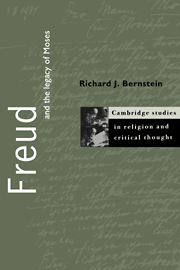Book contents
- Frontmatter
- Contents
- Preface
- List of abbreviations
- 1 The Egyptian origin of monotheism and the murder of Moses
- 2 Tradition, trauma, and the return of the repressed
- 3 Anti-Semitism, Christianity, and Judaism
- 4 “Dialogue” with Yerushalmi
- Appendix: an exchange of letters between Sigmund Freud and Lou Andreas-Salomé
- Notes
- Bibliography
- Index
3 - Anti-Semitism, Christianity, and Judaism
Published online by Cambridge University Press: 15 December 2009
- Frontmatter
- Contents
- Preface
- List of abbreviations
- 1 The Egyptian origin of monotheism and the murder of Moses
- 2 Tradition, trauma, and the return of the repressed
- 3 Anti-Semitism, Christianity, and Judaism
- 4 “Dialogue” with Yerushalmi
- Appendix: an exchange of letters between Sigmund Freud and Lou Andreas-Salomé
- Notes
- Bibliography
- Index
Summary
ANTI-SEMITISM AND CHRISTIANITY
I want to consider two other interrelated aspects of the Moses book: Freud's reflections on anti-Semitism and Christianity. Both of these topics are relevant for completing our analysis of Freud's concern with the distinctive character of the Jewish people. They will also enable us to understand a theme which plays an increasing role in Freud's mature thinking about the development of civilization – the extent to which this development is itself based upon a sense of guilt – a sense of guilt that results from the repression and the renunciation of instincts. According to Freud, this sense of guilt, especially strong among the Jewish people, was kept alive by the Prophets. The insatiable need to satisfy it eventually led to the imposition of “more and more new instinctual renunciations.” And these resulted in “ethical heights which had remained inaccessible to the other peoples of antiquity” (23:134).
It would be a mistake to think that Freud's discussions of anti-Semitism and Christianity are somehow afterthoughts to Freud's analysis of Mosaic monotheism. On the contrary, it is not an exaggeration to say that Freud's intense concern with anti-Semitism – especially Christian anti-Semitism – set the problematic that he wanted to address in his Moses book. Let us recall that in September, 1934 Freud wrote to Arnold Zweig: “Faced with the new persecutions, one asks oneself again how the Jews have come to be what they are and why they have attracted this undying hatred” (SFAZ, 91).
- Type
- Chapter
- Information
- Freud and the Legacy of Moses , pp. 75 - 89Publisher: Cambridge University PressPrint publication year: 1998

